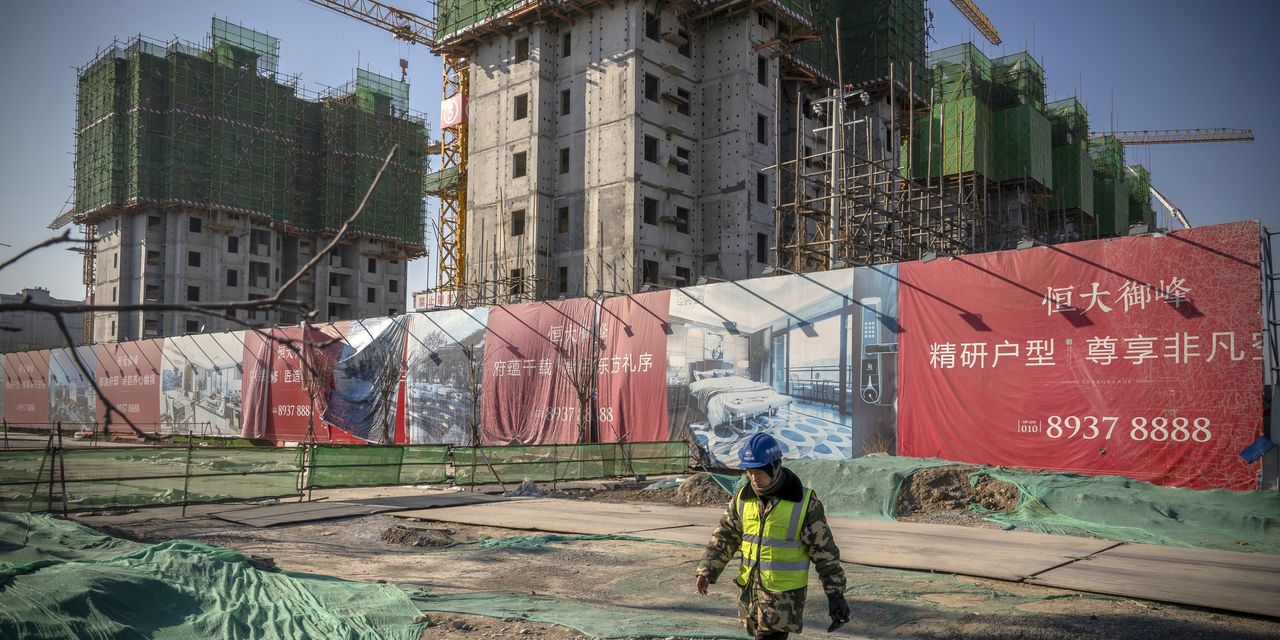
A group of China Evergrande Group’s EGRNF 8.11% international bondholders threatened to move forward with a legal enforcement plan that could potentially include liquidation of the company’s assets, after being unable to engage substantively with the troubled property developer for months.
Advisers to the group on Thursday released a strongly worded statement accusing Evergrande of withholding crucial information about its liabilities and failing to engage with its creditors despite the company’s recent pronouncements to the contrary. The bondholders, which include global funds, asset managers and distressed investors that hold Evergrande debt, are being advised by investment bank Moelis & Co. and law firm Kirkland & Ellis LLP.
Bondholders are still holding out for Evergrande to step forward and provide them with detailed financial information about the company’s balance sheet, liquidity and present operations before taking any enforcement actions, according to two people close to the bondholder group. It is hoping to discuss possible debt maturity extensions or standstill agreements so that a restructuring proposal can be formulated over the coming months, one of the people said.
If the status quo continues, legal action is likely to take place first in the Cayman Islands, although there are other jurisdictions where bondholders could assert claims, the person said. Evergrande is incorporated in the Cayman Islands, and has some subsidiaries incorporated in the British Virgin Islands, though most of its assets are in mainland China.
The group “believes it has been left with no option but to seriously consider enforcement actions,” the statement said. It said it “has received little more than vague assurances of intent, lacking in both detail and substance” from Evergrande. The group has retained Harneys, an offshore law firm, and “is prepared to take all necessary actions to vehemently defend its legal rights and protect its legitimate interests,” the statement added.
The next steps the advisers are considering are accelerating debt, filing a type of bankruptcy document known as a winding-up petition and beginning a liquidation process, according to a person familiar with the matter. Under liquidation, control of the company would shift to a legal controller, subject to court supervision, the person said.
Evergrande said in a regulatory filing on Friday that a risk-management committee at the company is “actively looking for solutions and communicating with its creditors.” The committee also proposed to engage China International Capital Corp. and BOCI Asia Ltd. as financial advisers and Zhong Lun Law Firm LLP as a legal adviser. Evergrande said they plan to address creditors’ demands and deal with the company’s debts “on a fair and equitable basis.”
The developer last year hired a unit of U.S. investment bank Houlihan Lokey Inc. as an adviser.
Thursday’s statement from the bondholder group came after the company reached an agreement with mainland creditors earlier this month to stave off a potential onshore default.
The 25-year-old property giant had amassed around $300 billion in liabilities as of last June, including around $20 billion in outstanding U.S. dollar bonds. Evergrande has struggled to meet its obligations since the summer, and has missed final deadlines for interest payments on several U.S. dollar bonds. All three major credit-rating companies have declared it to be in default.
Foreign bondholders have claims to a number of Evergrande’s offshore assets in the event that the company cannot repay them, including the company’s property management arm and an electric vehicle startup that Evergrande founded in 2018.
Some analysts have said the Chinese government is unlikely to support a restructuring where foreign bondholders are left out in the cold.
“China’s household savings rate isn’t enough to sustain China’s growth, so the country needs foreign capital to grow the economy,” said Bo Zhuang, senior analyst at Loomis Sayles & Co. in Singapore. “While foreign investors are definitely at the low end of the hierarchy, they will have a seat at the table before a restructuring is finalized.”
In early December, Evergrande said it had turned to its provincial government for help in dealing with its liquidity crisis. The government of Guangdong has dispatched a working group to help the company manage its risks, and Evergrande has set up a risk-management committee that includes its top executives and representatives of several state-backed entities.
The company said in regulatory filings in December and January that it planned to engage with its creditors, and that it would work with them to formulate a restructuring plan for its offshore indebtedness. Evergrande also said publicly that it would protect the legitimate interests of the various parties.
The international bondholder group said Thursday that hasn’t happened. “The overriding impression is that contrary to the group’s public words, which may at this point be construed as an attempt to stall any enforcement actions from the creditors, the group has disregarded its offshore creditors and the legal rights of its creditors,” their statement said. Evergrande has also ignored a request to pay the fees of its creditors’ advisers, a standard practice in a restructuring process, according to two people familiar with the matter.
Advisers to the committee of bondholders are concerned that the company might also have additional off-balance-sheet debt that it has not disclosed and that it might be in worse financial health than previously thought.
While Evergrande’s international bondholders have been left hanging, the developer has so far avoided defaulting on its yuan-denominated public debt onshore. Last week, Evergrande secured investor backing to delay making payments on one of its onshore bonds.
—Alexander Gladstone contributed to this article.
Write to Anna Hirtenstein at [email protected] and Alexander Saeedy at [email protected]
Copyright ©2022 Dow Jones & Company, Inc. All Rights Reserved. 87990cbe856818d5eddac44c7b1cdeb8








